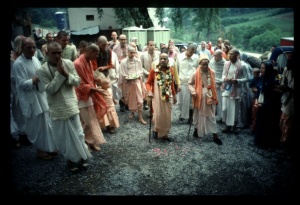CC Madhya 19.219: Difference between revisions
m (1 revision(s)) |
(Vanibot #0054 edit - transform synonyms into clickable links, which search similar occurrences) |
||
| (One intermediate revision by one other user not shown) | |||
| Line 1: | Line 1: | ||
{{ | [[Category:Sri Caitanya-caritamrta - Madhya-lila Chapter 19|C219]] | ||
<div style="float:left">'''[[Sri Caitanya-caritamrta|Śrī Caitanya-caritāmṛta]] - [[CC Madhya|Madhya-līlā]] - [[CC Madhya 19|Chapter 19: Lord Śrī Caitanya Mahāprabhu Instructs Śrīla Rūpa Gosvāmī]]'''</div> | |||
<div style="float:right">[[File:Go-previous.png|link=CC Madhya 19.218|Madhya-līlā 19.218]] '''[[CC Madhya 19.218|Madhya-līlā 19.218]] - [[CC Madhya 19.220|Madhya-līlā 19.220]]''' [[File:Go-next.png|link=CC Madhya 19.220|Madhya-līlā 19.220]]</div> | |||
{{CompareVersions|CC|Madhya 19.219|CC 1975|CC 1996}} | |||
{{RandomImage}} | |||
==== TEXT 219 ==== | ==== TEXT 219 ==== | ||
<div | <div class="verse"> | ||
kevala ‘svarūpa-jñāna’ haya śānta-rase | :kevala ‘svarūpa-jñāna’ haya śānta-rase | ||
‘pūrṇaiśvarya-prabhu-jñāna’ adhika haya dāsye | :‘pūrṇaiśvarya-prabhu-jñāna’ adhika haya dāsye | ||
</div> | </div> | ||
| Line 12: | Line 16: | ||
==== SYNONYMS ==== | ==== SYNONYMS ==== | ||
<div | <div class="synonyms"> | ||
''[//vanipedia.org/wiki/Special:VaniSearch?s=kevala&tab=syno_o&ds=1 kevala]'' — only; ''[//vanipedia.org/wiki/Special:VaniSearch?s=svarūpa&tab=syno_o&ds=1 svarūpa]-[//vanipedia.org/wiki/Special:VaniSearch?s=jñāna&tab=syno_o&ds=1 jñāna]'' — knowledge of the constitutional position of one’s self; ''[//vanipedia.org/wiki/Special:VaniSearch?s=haya&tab=syno_o&ds=1 haya]'' — there is; ''[//vanipedia.org/wiki/Special:VaniSearch?s=śānta&tab=syno_o&ds=1 śānta]-[//vanipedia.org/wiki/Special:VaniSearch?s=rase&tab=syno_o&ds=1 rase]'' — in the mellow of neutrality; ''[//vanipedia.org/wiki/Special:VaniSearch?s=pūrṇa&tab=syno_o&ds=1 pūrṇa]-[//vanipedia.org/wiki/Special:VaniSearch?s=aiśvarya&tab=syno_o&ds=1 aiśvarya]-[//vanipedia.org/wiki/Special:VaniSearch?s=prabhu&tab=syno_o&ds=1 prabhu]-[//vanipedia.org/wiki/Special:VaniSearch?s=jñāna&tab=syno_o&ds=1 jñāna]'' — knowledge of the full opulences of the Supreme Personality of Godhead; ''[//vanipedia.org/wiki/Special:VaniSearch?s=adhika&tab=syno_o&ds=1 adhika]'' — greater; ''[//vanipedia.org/wiki/Special:VaniSearch?s=haya&tab=syno_o&ds=1 haya]'' — becomes; ''[//vanipedia.org/wiki/Special:VaniSearch?s=dāsye&tab=syno_o&ds=1 dāsye]'' — in the transcendental mellow of servitude. | |||
</div> | </div> | ||
| Line 19: | Line 23: | ||
==== TRANSLATION ==== | ==== TRANSLATION ==== | ||
<div | <div class="translation"> | ||
“On the platform of śānta-rasa, one realizes only his constitutional position. But when one is raised to the platform of dāsya-rasa, he better understands the full opulence of the Supreme Personality of Godhead. | “On the platform of śānta-rasa, one realizes only his constitutional position. But when one is raised to the platform of dāsya-rasa, he better understands the full opulence of the Supreme Personality of Godhead. | ||
</div> | </div> | ||
__NOTOC__ | |||
<div style="float:right; clear:both;">[[File:Go-previous.png|link=CC Madhya 19.218|Madhya-līlā 19.218]] '''[[CC Madhya 19.218|Madhya-līlā 19.218]] - [[CC Madhya 19.220|Madhya-līlā 19.220]]''' [[File:Go-next.png|link=CC Madhya 19.220|Madhya-līlā 19.220]]</div> | |||
__NOTOC__ | |||
__NOEDITSECTION__ | |||
Latest revision as of 22:28, 19 February 2024
Śrī Caitanya-caritāmṛta - Madhya-līlā - Chapter 19: Lord Śrī Caitanya Mahāprabhu Instructs Śrīla Rūpa Gosvāmī

His Divine Grace
A.C. Bhaktivedanta Swami Prabhupada
A.C. Bhaktivedanta Swami Prabhupada
TEXT 219
- kevala ‘svarūpa-jñāna’ haya śānta-rase
- ‘pūrṇaiśvarya-prabhu-jñāna’ adhika haya dāsye
SYNONYMS
kevala — only; svarūpa-jñāna — knowledge of the constitutional position of one’s self; haya — there is; śānta-rase — in the mellow of neutrality; pūrṇa-aiśvarya-prabhu-jñāna — knowledge of the full opulences of the Supreme Personality of Godhead; adhika — greater; haya — becomes; dāsye — in the transcendental mellow of servitude.
TRANSLATION
“On the platform of śānta-rasa, one realizes only his constitutional position. But when one is raised to the platform of dāsya-rasa, he better understands the full opulence of the Supreme Personality of Godhead.